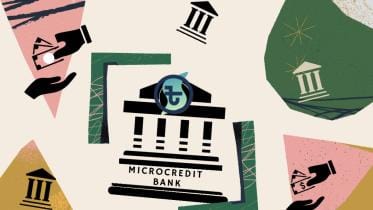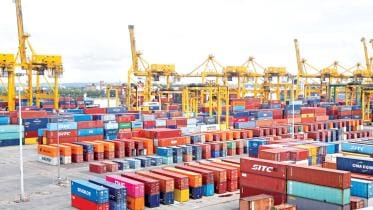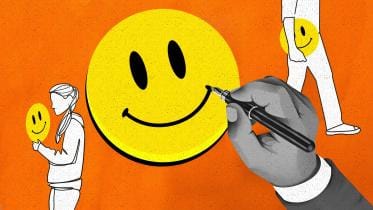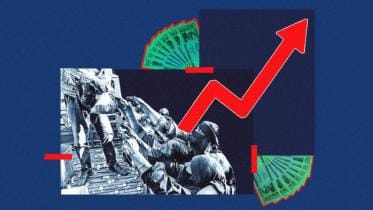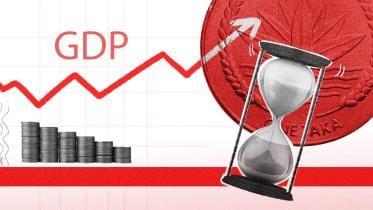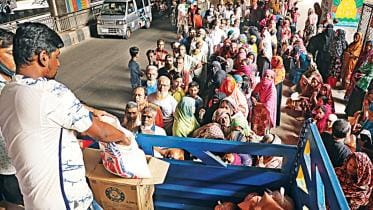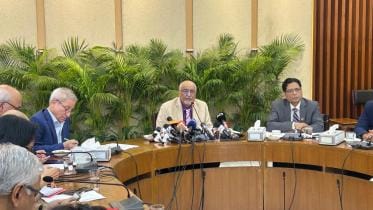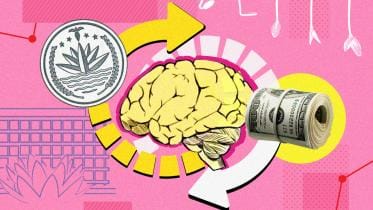Economy
When crime becomes an economic risk
Time to restore stability as a fundamental economic imperative
16 January 2026, 08:00 AM
Why we need microcredit banks
"Financial inclusion" has been a buzzword in Bangladesh for many years.
6 January 2026, 07:00 AM
Why is our logistics policy failing to deliver on its promise?
In 2024, Bangladesh announced its first National Logistics Policy, a crucial reform for an economy where logistics costs devour 15-20 percent of GDP—nearly double the global average.
4 January 2026, 06:00 AM
Rare earth elements are the new drivers of global power
Whoever controls them gains not only industrial advantage but diplomatic and economic influence.
1 November 2025, 08:00 AM
What are the current realities of Bangladesh’s economy?
Over the past few years, the economy has been facing tough challenges.
27 September 2025, 06:00 AM
Bangladesh’s banks must adopt new tools to serve the digital-first generation
Embedded finance and BaaS can make finance invisible, intuitive, and inclusive.
5 August 2025, 10:30 AM
Can Bangladesh forge its own 'economic miracle'?
Still struggling after five decades, Bangladesh has turned into a development paradox.
19 June 2025, 07:01 AM
The headless industry dilemma: Navigating the fallout of crony capitalism
The golden rule of crony capitalism, in which profits are private but losses are social, has led to blatant injustice, as is generally recognised. The extra-market connections of crony capitalists facilitated transactional benefits while leading to entrenched market power, distorted competition, and depressed productivity growth, all contributing to growing inequalities. Yet, attempts to change the crony business model are facing their own dilemmas.
24 March 2025, 18:00 PM
Happiness? In this economy?
International Day of Happiness in Bangladesh: A cruel joke? Few find joy amidst daily struggles.
20 March 2025, 02:44 AM
In Bangladesh, inflation control needs an iconoclastic approach
Bangladesh inflation soared (5.86 percent to 11.38 percent in 2022-2024), driven by global shocks and food prices.
4 March 2025, 10:00 AM
The honeymoon period of the interim government is over
What started as a moment of hope—a chance to break free from the chains of authoritarian rule—has increasingly turned into a struggle for meaningful reform.
14 February 2025, 05:00 AM
Economy slows to 1.81% in volatile first quarter
The Bangladesh economy saw its lowest quarterly growth in three-and-a-half years in the first quarter of the fiscal year on the back of political upheaval and severe flood in August.
6 January 2025, 18:10 PM
Inflation eases in December but stays over 10%
Arrival of winter vegetables contributes to the decline
6 January 2025, 05:41 AM
BB Governor acknowledges failures, achievements in financial sector
The central bank governor made this remark while inaugurating the Golden Jubilee Celebration of Bangladesh Institute of Bank Management (BIBM) in the city.
29 December 2024, 08:59 AM
The poor need direct support to cope with economic anxieties
Our data shows economic pressures and polycrisis have been growing especially since Covid.
18 December 2024, 09:50 AM
Bangladesh’s exports may rise as Trump considers tariffs on China, says top businessman
"The imposition of higher tariffs on Chinese goods by the Trump administration could prompt international businesses and investors to turn to Bangladesh," Ahsan Khan Chowdhury, chairman of Pran-RFL Group, said today
10 December 2024, 08:54 AM
Inflation hits four-month high
Rises to over 11% for second time this year
5 December 2024, 05:24 AM
Debapriya's white paper points to grand corruption
Says, turned Bangladesh from crony capitalism to kleptocracy
2 December 2024, 08:29 AM
Opportunity economy: An inclusive economic system for new Bangladesh
The Opportunity Economy (OE) is not only an inclusive economic system, but a new paradigm.
28 October 2024, 12:55 PM
Domestic factors account for 74% of inflation: Bangladesh Bank
Persistent inflation driven by high commodity, energy prices and currency depreciation
22 October 2024, 07:05 AM




